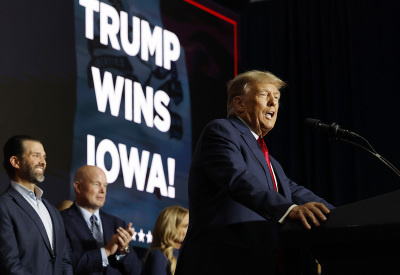‘God made Trump’ appeals to a Christian Nationalism foreign to the Bible

After months of campaigning, debating, and politicking, the 2024 election is officially underway. While political pundits and prognosticators focus their analysis of the Iowa caucus on which of the Republican candidates — Florida Governor Ron DeSantis, Nikki Haley, Donald Trump — can sustain their campaigns into the New Hampshire primary, a widely distributed viral video (and one campaign’s embrace of its messaging) provides an opportunity for thoughtful Christian reflection about the interplay between politics and faith.
Over the past few years, academics and journalists have written ad nauseam about the alleged dangers of “Christian Nationalism.” From melodramatic warnings of the “Far-Right Christian Quest for Power,” to Bill Maher blaming “fundamentalist Christians” for January 6, to Tim Alberta decrying conservative Christians and their supposed “right-wing nationalist fervor” in his latest book, conservative Christians remain the Left’s favorite scapegoat for what ails America’s politics.
As I’ve explained elsewhere, it is evident that the term “Christian Nationalism” is an epithet often wielded against politically engaged Christians in order to discredit or dismiss them. Although the overwhelming majority of believers do not wish to impose any sort of theocracy on their fellow citizens, advocacy for the unborn and opposition to radical gender ideology is routinely framed as “extreme” and hateful. So, while Christians should rightly stand up to those who would love nothing more than to drive Christian and conservative voices from the public square, there is a segment within the conservative movement that has proven susceptible to conflating their Christian and American identities.
An example of this conflation is the video shared by Trump in the lead-up to the Iowa caucus. On January 5, the former president shared a video on Truth Social titled “God Made Trump.” Although not produced by the Trump campaign, the president promoted the video, which was amplified on X by Rep. Marjorie Taylor Greene (R-Ga.) and Pastor Paula White and viewed by millions. Additionally, Trump’s campaign played the video before he took the stage at several rallies in Iowa.
In my view, the video is a legitimate example of an inappropriate synthesis of religion and politics. Using artificial intelligence to mimic the voice of the late Paul Harvey, the video intentionally riffs on Harvey’s 1978 “So God Made a Farmer” speech. “God looked down on his planned paradise and said, ‘I need a caretaker,’ so God gave us Trump,” begins the clip.
Combining biblical themes, Scripture, and campaign promises, the advertisement presents the former president in a quasi-messianic light. At one point, the narrator describes Trump’s arms as “strong” yet “gentle,” employing language similar to how God is described in Isaiah 40:11. At another point, the video borrows language from Matthew 12:34, saying, “God had to have someone willing to go into the den of vipers.” Additionally, referring to the media, the narrator quotes Psalm 140:3 (NIV) verbatim, asserting that God needed Trump to “call out the fake news for ‘their tongues as sharp as a serpent’s; the poison of vipers is on their lips.’”
Elsewhere, the video refers to Trump as “strong and courageous,” the very language used to exhort Joshua, Moses’s successor, at the onset of his ministry. Finally, the video describes Trump as “a man who cares for the flock” and a “shepherd to mankind who won’t ever leave nor forsake them.” The latter description is a direct quotation of Deuteronomy 31:6, which in context is God’s promise to Joshua and Israel as they enter the Promised Land. The author of Hebrews cites this promise to encourage Christians of God’s presence with them (see Hebrews 13:5).
The Bible unmistakably condemns idolatry (Exodus 20:3-6; 1 John 5:21), and the God of the Bible demands exclusive loyalty from His covenant people. Intentionally appropriating descriptions reserved for God and assigning them to a political candidate for the purpose of inspiring worship-like devotion is not only bad exegesis but blasphemous. In other words, “God Made Trump” is not problematic for highlighting the Trump administration’s achievements; the video is inappropriate because it purposely co-opts biblical language for unbiblical ends.
In summary, although I generally dismiss allegations of “Christian nationalism” as thinly disguised efforts to silence Christians in the public square, the video played at Trump’s recent campaign events is a legitimate example of conflating Christianity with a political agenda, i.e. Christian Nationalism. Christians can never ascribe ultimate devotion and loyalty to anyone or anything besides the God of the Bible. Although advocating and championing one’s political candidate is a valid civic exercise, Christians must resist the temptation to infuse politics with transcendent meaning. A telltale sign that faithful engagement has devolved into idolatry is the misuse and misappropriation of Scripture to baptize one’s preferred candidate or platform.
As the 2024 election gets into full swing, Christians have an opportunity to model a faithful politics that keeps everything in perspective. Elections and campaigns matter. But the people of God must engage the political process as Christians, understanding that whoever is elected in November is ultimately a fallible human, not a messiah (Psalm 146:3-5).
Originally published at The Washington Stand.




























